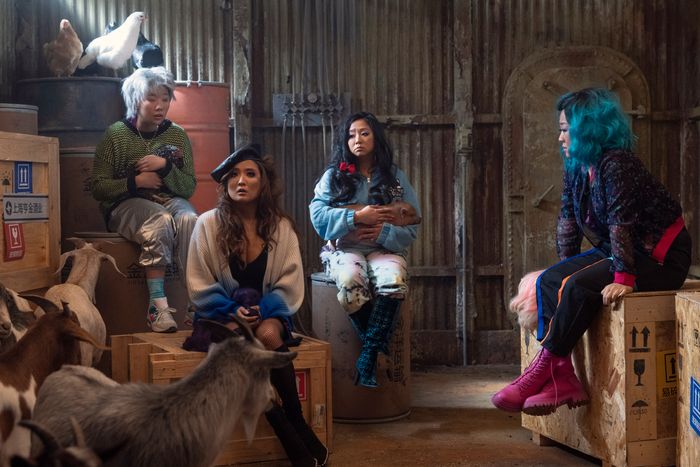
Joy Ride, a semi-rowdy new comedy about four Asian American 20-somethings on a chaotic trip through China, feels equally inspired by Bridesmaids and The Hangover. By the time it limped into a final act that’s far more sappy than funny, I wished it had leaned just a little more toward the anarchy of the latter. Joy Ride, the directorial debut of Crazy Rich Asians and Raya and the Last Dragon screenwriter Adele Lim, may be a celebration of the kind of behaving badly that involves stuffing drugs up orifices, indulging in spontaneous three-ways, and revealing an intimate tattoo to the world. But when it comes to the kind of bad behavior that might actually test the likability of members of its ensemble, the film wimps out. Hell, it can barely bring itself to let the characters — lawyer Audrey (Ashley Park), artist Lolo (Sherry Cola), actor Kat (Stephanie Hsu), and K-pop stan Deadeye (Sabrina Wu) — look ruffled even when they’ve been trudging through the Chinese countryside after being booted from a train. At a certain point, they have an inevitable blowup fight, and when Audrey is called out for being self-involved, it feels like an insult plucked randomly from the air. Joy Ride is too protective of its characters to let Audrey truly be a narcissist, or Lolo a deadweight, or Kat a phony, or Deadeye a true weirdo. Its glee is infectious, but it peters out long before the movie’s over.
It’s Audrey who gets the plot moving, courtesy of her job as an associate at a law firm, where she’s parlayed her identity into an opportunity to land a deal with a Beijing businessman played by Ronny Chieng and where she’s vying for partner among a pack of white men. Audrey is comfortable being the only Asian in the room — she and her bestie Lolo grew up in the Washington town of White Hills, whose name applies literally. Among the community’s many white residents are Audrey’s parents (David Denman and Bridesmaids writer Annie Mumolo), who adopted her from China as a baby. The other characters like to joke that Audrey’s basically white — at one point, she lists her favorite musical acts as Mumford & Sons, the National, and Taylor Swift — but the most interesting thing the movie does is ramp this up into some light, if inconsistent, internalized racism. Audrey doesn’t like Chinese food, has never had sex with an Asian guy, and heads to China expecting it to be a land of foreigner-targeting danger. This is a nervy gambit particularly in conjunction with a twist involving Audrey’s reluctant search for her birth mother. (The script, by Cherry Chevapravatdumrong and Teresa Hsiao, feels sharper than the overall movie.) But while Park is a charismatic lead, the movie never seems comfortable clowning on her character’s cultural disconnection.
Maybe what’s holding Joy Ride back is that there’s a sense of responsibility accompanying its R-rated high jinks. Lolo, who’s been living contentedly in a converted garage in Audrey’s backyard, is an artist who talks about using her erotic-themed work to battle shame and challenge the fetishization with which Asians can be regarded. Joy Ride aims to do something similar in having its main characters (with the exception of Deadeye, who instead gets an abbreviated journey that maybe leads to an offscreen coming out as nonbinary) unapologetically own their desires and remain in full control of their sexuality. It’s equally deliberate in its depiction of Asian men, who — from Kat’s hunky co-star and fiancé Clarence (Desmond Chiam) to the members of the local basketball team the friends encounter — are gazed at with an ebullient lust to counterbalance decades of western desexualization. But there’s a clunky self-consciousness to these choices that runs counter to the pursuit of chaotic comedy with some jokes feeling more like they were written to underscore those big ideas than to be funny. On a more technical level, Lim doesn’t have a natural sense of timing when it comes to punch lines. A sequence in which the characters try to pass themselves off as newly minted K-pop stars has a clever setup but fails to explode into something ecstatic when the music kicks in. A scene involving a run-in with a drug smuggler (played by Meredith Hagner) is carried by Hsu’s facial expressions but comes to a disappointingly anticlimactic payoff. A night of various sexual encounters, one involving Baron Davis playing himself, is less effective for cutting between characters.
But Joy Ride’s problem is that it never really manages to cut loose. It features enough outrageous moments to be a fine diversion, but despite a totally game cast — with Hsu as the MVP, playing a tormented horndog who has rebranded herself as a good girl while working in China for career and romantic reasons — it’s never as bold as it wants to be. Watching the film is a reminder that the most boundary-pushing comedy isn’t about risqué content but a willingness to get uncomfortable and the confidence to assume audiences will join along in that journey. Joy Ride instead seeks out the warm fuzzies in a way that feels like a surrender.
More From This Series
- The Accountant 2 Can Not Be Taken Seriously
- Another Simple Favor Is So Fun, Until It Gets So Dumb
- Errol Morris Has Been Sucked Into the Gaping Maw of True Crime


